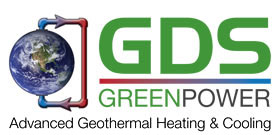



Frequently Asked Questions
Q. What is a heat pump?
A. A conventional air conditioner is a type of air-source heat pump, meaning it transfers heat from your home to the outside air. A true air source heat pump can also operate ‘in reverse’….capturing and concentrating warmth from the outside air in cold weather and transferring the heat into your home.
Geothermal (or ground-source) heat pumps use piping buried in the ground (called a ground loop) to transfer heat from your home in the summer, and into your home in the winter.
Q. Haven’t heat pumps been around a long time?
A. Yes, air-source heat pumps have been used for decades, mostly in regions of the country with mild winter weather, where the heating needs are modest and the outside air temperature is mild. Under such conditions, air-source heat pumps can be a moderately efficient heat source. However, in more extreme winter climates, they don’t work well, because their efficiency falls off severely as the outside temperature falls. In areas like the Northeast and North Central parts of the country, a fuel source will almost always be more economical for winter heating.
Q. So what’s better about ground-source heat pumps?
A ground-source heat pump is much, much more efficient for a couple of reasons: the ground can store a tremendous amount of heat energy, and ground temperatures below a few feet from the surface stay pretty constant year-round. What this means in the summer is that in A/C mode, a ground-source heat pump has a much easier time getting rid of the heat it captures from your house by putting it into the relatively cool ground than by trying to put it into hot air. In the winter, there is a steady supply of heat energy in the ground that the heat-pump can capture, concentrate, and move into your house.
Because underground temperatures are fairly constant (with some seasonal variation at shallower depths), the efficiency of a ground-source system doesn’t vary with outside temperature. For example, the hotter the weather, the more heat your conventional air conditioner needs to take out of your house…..but the hotter the outside air, the harder it has to work to get rid of it. So the more you need it, the less efficient it is…and the more it costs you in electricity. But a ground-source system provides the same efficiency on the hottest days…yes, it will run longer than on less-hot day, but it will keep the same ultra-high efficiency, and save a tremendous amount of energy. The hotter the weather, the more it saves you.
In the winter, running in ‘reverse’, a ground source heat pump uses that same amount of electricity to pull heat out of the ground, concentrate it, and move it into your home. So each unit of electric energy it uses is multiplied in terms of heat produced, because it’s ‘pumping’ heat out of the earth, rather than making heat like a toaster does.
Q. Okay, I get that it’s much cheaper to operate for air conditioning, but what’s cheaper to heat with…a geothermal heat pump, or a fuel-based furnace or boiler?
A. The ground-source heat pump will win hands down almost every time. The apples-to-oranges comparison depends on the fuel source, the boiler or furnace efficiency, the cost of fuel (which, as we all know, is very volatile), the efficiency of the heat-pump, and the cost of electricity (which is historically much less volatile). But because the geothermal heat-pump is, in effect, ‘mining’ and moving heat from underground into your home vs. burning some type of fossil-fuel, it uses much less energy.
If we performed a cost comparison in the summer of 2008, when #2 heating oil was $5 a gallon, the answer would be different than in the spring of 2009, when it was $2.39. In any event, for a large home in the Northeast that currently uses oil heat, for example, the answer would likely to be ‘thousands of dollars per year’.
Q. I’m really trying to reduce my ‘carbon footprint’. For example, I drive a hybrid car, I recycle, and I upgraded the insulation and windows in my home. Saving money is great, but climate change is really an important issue to me. Will a geothermal system help me further reduce my carbon footprint?
A. Yes, in a big way. Heating and cooling buildings requires one of the biggest slices of the energy ‘pie’. By radically raising the efficiency of the system and reducing the amount of energy required, the building’s carbon footprint will shrink. And if your utility lets you opt for a carbon-free electricity source (solar, wind, hydro, biomass…and depending on your point of view, nuclear), a geothermal system can heat and cool your home with zero carbon footprint.
Cars make a good analogy: a poorly insulated house with fuel-based heat is like a giant SUV. A well-insulated house with a high-efficiency furnace is more like a hybrid. But a house with a geothermal system is more like an all-electric car. It’s the future…available now.
Q. Don’t air conditioners and heat pumps use chemicals that harm the ozone layer?
A. Traditionally, air conditioners and heat pumps (as well as aerosol cans) operated using compounds called CFCs and HCFCs. Scientists long ago determined that the chlorine in chlorofluorocarbons (CFCs) like Freon R-12 and hydrochloroflourocarbons (HCFCs) like Freon R-22 attack and destroy the thin ozone layer in the stratosphere, allowing increased amounts of harmful ultraviolet (UV) radiation from the sun to reach the earth. The Montreal Protocol has resulted in the outright banning or future phaseout of these compounds. Earth To Air Systems geothermal heat pumps use an environmentally friendly, compound called R-410a, which is both chlorine-free and not on any phaseout plan. This means 2 things: your ETA geothermal system will not harm the ozone layer, and future service to your system will not be jeopardized as these older compounds disappear from the market.
Q. But geothermal systems have been around a long time, and haven’t been widely used. Why is that, and what’s different now?
A. There’s a variety of reasons. Like a hybrid or electric vehicle, the up-front cost is higher than for traditional heating and cooling systems. When fuel was cheap, and no one was thinking in terms of climate change, the amount of time it would take to break even was too long for most people to consider. Earlier systems also didn’t have the operating efficiency that people expected, and so there was disappointment. When the government subsidized energy conservation and alternative energy, geothermal systems were generally overlooked in favor of solar and wind. And earlier-generation geothermal systems use a complex system of pipes, water pumps, and heat exchangers to move heat into and out of the ground. Complex systems tend to be less reliable and require specialists to repair.
Beginning in 2009, the federal government has started providing a tax credit of 30% for residential geothermal heat pump installations…the same as for other alternative energy sources like solar or wind. States and utilities are also stepping up, recognizing the big impact these systems can have. Heating fuel prices have increased over time, and remain unpredictable. And the next-generation Direct Exchange (DX) technology incorporated into the Earth To Air Systems (ETA) geothermal systems is much simpler and more efficient than older water-source geothermal systems. When these factors are combined, the payback equation has become extremely attractive….more so than ever before.
Q. I thought ‘green energy’ meant solar panels or a wind turbine. What makes an ETA Systems geothermal system a better investment?
A. Solar cells remain very expensive for the amount of electricity they produce. They are heavily subsidized in many areas of the country, but still provide extremely long payback periods, especially outside of the desert Southwest. And not every house or business is in a good location to take advantage of them. Wind turbines are also problematic to site, and many areas don’t have high enough average wind speeds to make them efficient. But everywhere has Mother Earth underneath, with her steady underground temperature. An ETA geothermal system can work with her to keep you warm in the winter and cool in the summer, and save you enough money to pay for itself in many cases years sooner than solar or wind.

Phone 973.993.9199 Fax 973.993.8444
39 East Hanover Ave. Morris Plains NJ 07950